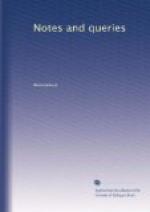“Besides, such a splitting
up of a word of significant and
perfect meaning in itself
is always a bad and suspicious mode
of derivation.
“It is generally an
after-thought, suggested by some
fortuitous or fancied coincidence,
that appropriateness of
which is by no means a sufficient
proof of probability.
“Of this there can scarcely be a better example than the English word ‘news,’ which, notwithstanding the felicity of its supposed derivation from the four cardinal points, must, nevertheless, so long as the corresponding words ‘nova,’ ‘nouvelles,’ &c. exist, be consigned to its more sober and common-place origin in the adjective ‘new.’”
To this it must be added that the ancient orthography of the word newes, completely upsets the derivation Mr. Gutch has brought before your readers. Hone quotes from “one Burton, printed in 1614: ’if any one read now-a-days, it is a play-book, or a pamphlet of newes.”
I had been in two minds whether or not to send this communication, when the scale is completely turned by the apropos occurrence of a corroboration of this latter objection in “NOTES AND QUERIES” of this day. Mr. Rimbault mentions (at p. 277.), “a rare black letter volume entitled Newes from Scotland, 1591.”
Here is one more proof of the usefulness of your publication, that I am thus enabled to strengthen the illustration of a totally different subject by the incidental authority of a fellow correspondent.
A.E.B.
Leeds, March, 1850.
* * * * *
REPLIES TO MINOR QUERIES.
Swot is, as the querist supposes, a military cant term, and a sufficiently vulgar one too. It originated at the great slang-manufactory for the army, the Royal Military College, Sandhurst. You may depend upon the following account of it, which I had many years ago from the late Thomas Leybourne, F.R.S., Senior Professor of Mathematics in that college.
One of the Professors, Dr. William Wallace, in addition to his being a Scotchman, had a bald head, and an exceedingly “broad Scotch” accent, besides a not very delicate discrimination in the choice of his English terms relating to social life. It happened on one hot summer’s day, nearly half a century ago, that he had been teaching a class, and had worked himself into a considerable effusion from the skin. He took out his handkerchief, rubbed his head and forehead violently, and exclaimed in his Perthshire dialect,—“It maks one swot.” This was a God-send to the “gentlemen cadets,” wishing to achieve a notoriety as wits and slangsters; and mathematics generally ever after became swot, and mathematicians swots. I have often heard it said:—“I never could do swot well, Sir;” and “these dull fellows, the swots, can talk of nothing but triangles and equations.”




